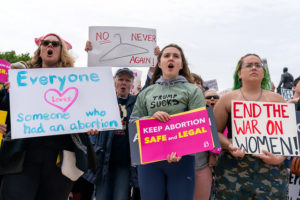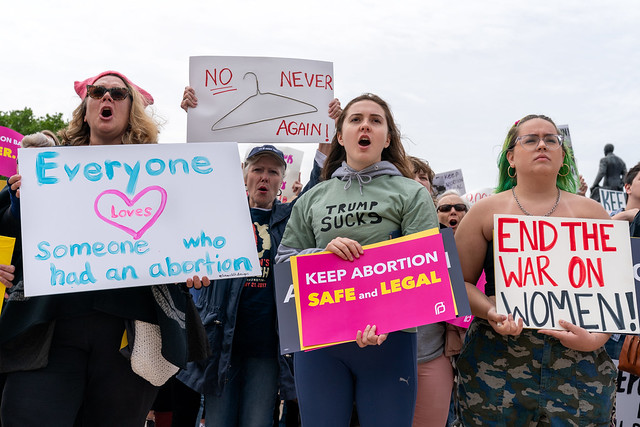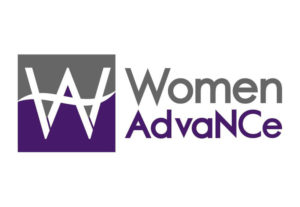 The number of abortion clinics in the U.S. has been dwindling for quite some time, but the recent wave of anti-abortion state legislation sweeping the country is sure to accelerate this trend. Increasingly restrictive abortion regulation—such as heartbeat laws that ban abortion once a fetal heartbeat can be detected, which can happen as early as 6 weeks, before some women ever realize they’re pregnant—has passed this year in states like Mississippi, Georgia, and Ohio. Alabama has effectively banned abortion altogether, even in cases of rape and incest, making it a felony (except in cases where the mother’s life is endangered). “Although a lot of weight seems to be put on the detection of this flutter, ‘by no means does it translate to viability of the heart’ or viability of the pregnancy,”
The number of abortion clinics in the U.S. has been dwindling for quite some time, but the recent wave of anti-abortion state legislation sweeping the country is sure to accelerate this trend. Increasingly restrictive abortion regulation—such as heartbeat laws that ban abortion once a fetal heartbeat can be detected, which can happen as early as 6 weeks, before some women ever realize they’re pregnant—has passed this year in states like Mississippi, Georgia, and Ohio. Alabama has effectively banned abortion altogether, even in cases of rape and incest, making it a felony (except in cases where the mother’s life is endangered). “Although a lot of weight seems to be put on the detection of this flutter, ‘by no means does it translate to viability of the heart’ or viability of the pregnancy,”
Today there are roughly 750 operational abortion clinics nationwide, with 16 in the state of North Carolina. Yet over 11 million women in the U.S. live more than an hour away from a clinic and face significant obstacles to get an abortion; distance and associated traveling costs, mandatory waiting periods, and prohibitive procedural costs (especially for uninsured women or women paying out of pocket) are barriers that must be overcome. While women theoretically have the right to an abortion under Roe v. Wade, the lack of access undermines the 1973 Supreme Court ruling.
The shortage of abortion clinics is due in large part to the unnecessarily rigorous requirements facilities must meet. Collectively known as TRAP (Targeted Regulation of Abortion Providers) laws, these laws are seemingly designed to make abortion clinics safer for women, but ultimately result in many of them closing down when they fail to live up to unrealistic standards. Although these laws may appear helpful, they have no medical basis. TRAP laws generally include issues such as: building size requirements that dictate hallway width, location requirements that prevent clinics from being near schools, and reporting requirements that can force clinics to disclose sensitive information. In sharp contrast to the harsh regulation and vanishing number of abortion clinics, there is a virtual lack of regulation of the 4,000+ crisis pregnancy centers across the U.S.
Crisis pregnancy centers (CPCs) present themselves as abortion clinics and employ several less-than-honest techniques to lure women in their doors. For instance, many CPCs locate themselves next to legitimate abortion clinics and entice women with free pregnancy testing, ultrasounds, and counseling services. They often use neutral language surrounding women’s choices. According to Felicia Brown Williams, the director of Planned Parenthood Mississippi, “many crisis pregnancy centers intentionally use names that . . . could be easily construed as abortion providers” in an effort to deceive women into thinking they’ll be informed about all their options. This couldn’t be further from the truth. In reality, CPCs advocate for two options and two options only: parenting or adoption. Once inside, it is not uncommon for women to be lectured on marriage, abstinence, and Christianity. CPCs encourage women to keep their baby (a deliberate linguistic choice reflecting their emphasis on motherhood) and many women walk away feeling ashamed, confused, or conflicted.
Despite being blatantly unethical, these deceitful tactics are in fact legal. CPCs are considered nonprofits and thus are not subject to the strict requirements of actual medical facilities. Personnel do not even have to be medically trained despite the (wildly inaccurate) medical advice they give clients. Many CPCs advise women that abortion causes breast cancer (which is false!), can lead to sterility down the road (also false!), and that condoms are not helpful in preventing pregnancy/STIs (most definitely untrue!).
The fact that CPCs attempt to coerce and emotionally manipulate women is appalling, but legally defensible under the First Amendment. In a 2018 case, NIFLA v. Becerra, the Supreme Court ruled that pro-life CPCs could not be forced to post signs about abortion services available in the state, as it was a violation of free speech. This is yet another example of how organizations are treated as people and granted the same freedoms as individuals. And since CPCs do not charge for their services, they are subject to less regulation than commercial free speech. However, there is potential for lawsuits against CPCs to be more successful by bringing forward charges of medical malpractice.
Abortion is a hot-button issue, but we should all be able to agree that tricking women is wrong. As of now, there are roughly 110 CPCs in North Carolina. Last year, $1.55 million in taxpayers money went to funding CPCs, while abortion clinics rarely get any type of government assistance. Unless legal action is taken or awareness is raised, women will continue to fall prey to these organizations and be shamed for making a choice that should have been wholly theirs to begin with.


There are no comments
Add yours